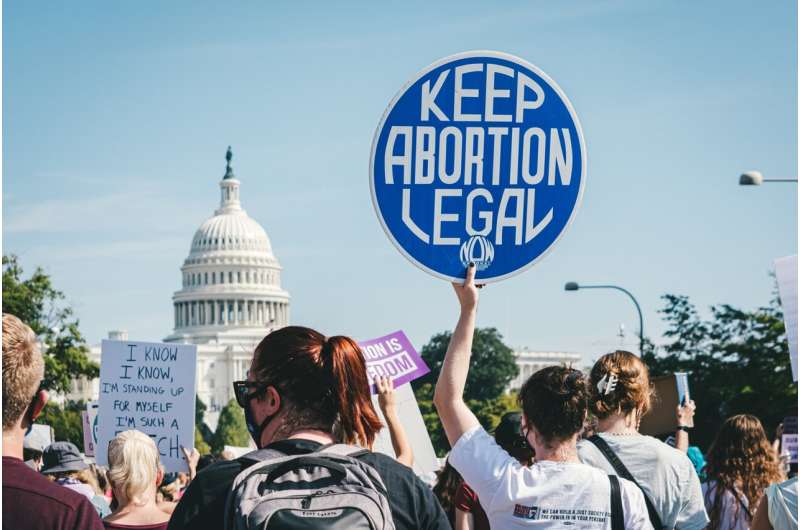This article has been reviewed according to Science X's editorial process and policies. Editors have highlighted the following attributes while ensuring the content's credibility:
fact-checked
peer-reviewed publication
trusted source
proofread
After the US Supreme Court restricted abortion rights, public support for abortion increased: Study

A new study examining the effects of the U.S. Supreme Court ruling on Dobbs v. Jackson Women's Health Organization on June 24, 2022, which overturned Roe v. Wade's constitutional protection of abortion rights, finds that the American public's support for abortion increased after the decision.
The findings have been published in Nature Human Behaviour.
"Our results show the extent to which the Supreme Court is out of step with the American public," says co-author Sean Westwood, an associate professor of government at Dartmouth and director of the Polarization Research Lab.
The study's findings were based on a large, three-wave survey before the leak on May 2, 2022 of the drafted Dobbs opinion, after the leak but before the final ruling, and after the ruling. The team also examined how perceptions on abortion rights may have been affected by television and social media.
The results showed people's perceptions on when a fetus is viable changed, shifting from above 15 weeks to below 15 weeks, on average.
Perceptions on the constitutional legality around abortion also changed, as respondents were significantly more likely to report that abortion should be legal for women who choose to have one, increasing 2.4 percentage points between the weeks before and after the Dobbs ruling.
After the leak, the perceived legitimacy of the Supreme Court decreased among Democrats by 11.3 percentage points and increased 3.2 percentage points among Republicans.
"Americans increasingly see the Supreme Court as partisan and not a neutral judicial body," says Westwood. "While public support for court decisions varies, the perceived legitimacy of the Court itself has been stable historically. Americans didn't like their side to lose in the Court, but a loss didn't make them question the mandate of the court."
"The fact that a single decision could have such a large effect on Court legitimacy is quite surprising, and is emblematic of the modern polarized era," says Westwood. "Today a Supreme Court decision isn't just seen as a win or a loss to a group, but it's now seen as something that alters the legitimacy of the Court itself."
This particular Court case was special not only because there was massive media coverage around the decision, but there was coverage when the case was argued, on the anticipated ruling, and on the leak. A large majority of that coverage was framed around a court that might go against public opinion in support for abortion access.
"Restrictions in abortion rights stand in strong contrast to the public will, and our study shows that the public stood their ground after the court ruling, with support for abortion rights actually increasing after the Dobbs decision," says Westwood.
The researchers chose to study the effects of the Dobbs case on public perceptions and views, as prior research has often focused on the impact of a Supreme Court ruling that expands rights, and they wanted to examine the effects of a ruling that restricts rights and is contrary to the prevailing public opinion.
Chelsey Clark and Elizabeth Levy Paluck at Princeton University, Maya Sen at Harvard University, Neil Malhotra at Stanford University, and Stephen Jessee at The University of Texas at Austin, also served as co-authors of the study.
More information: Chelsey S. Clark et al, Effects of a US Supreme Court ruling to restrict abortion rights, Nature Human Behaviour (2023). DOI: 10.1038/s41562-023-01708-4
Journal information: Nature Human Behaviour
Provided by Dartmouth College




















